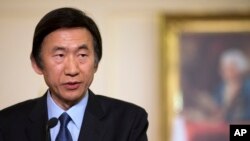South Korea's foreign minister is making a rare trip to Japan, raising hopes of a possible thaw in bilateral ties.
Yun Byung-se will visit Tokyo Sunday to attend a ceremony for the 50th anniversary of a treaty normalizing relations between Japan and South Korea, South Korea’s Foreign Ministry said Wednesday. The trip marks the first visit by the top South Korean diplomat to Japan since 2011.
“In the South Korea-Japan foreign minister’s meeting slated to be held on the afternoon of June 21, South Korean Foreign Minister Yun and Japanese Foreign Minister Kishida will share ideas on mutual concerns, including bilateral relationship, North Korean issues, regional and international issues,” Noh Kwang-il, spokesman for South Korea’s Foreign Ministry, told reporters.
Relations between Tokyo and Seoul have soured since Prime Minister Shinzo Abe came to power in December 2012. Abe’s visit to the Yasukuni shrine that honors Japan's war dead, including 14 convicted World War II-era war criminals, and his position on Japan’s aggressions during the conflict have angered South Korea and China.
The United States has been quietly pushing the two allies to mend relations. Recently, Tokyo and Seoul engaged in a series of talks to narrow differences over the issue of “comfort women,” the sexual enslavement of some 200,000 women and girls, mostly from Korea and China, by the Japanese Imperial Army. The two sides made some progress in the talks.
“There has been considerable progress on the issue of the comfort women, and we are in the final stage of our negotiations. So I think we can expect to look forward to a very meaningful 50th anniversary of the normalization of our diplomatic ties,” said South Korean President Park Geun-hye in an interview with the Washington Post.
Analysts said Foreign Minister Yun’s trip is a positive shift in Tokyo-Seoul bilateral relations.
“Minister Yun’s visit to Tokyo is a very important signal that Japan-Korea relations are improving. Although there are considerable differences between Tokyo and Seoul over historical questions, Japanese military defense, relations with China and other issues, the two sides are at least willing to talk now at a high level,” Charles Armstrong, a professor of history at Columbia University who specializes in Korean studies, wrote in an e-mail to the VOA Korean service.
Shihoko Goto, the Wilson Center’s senior associate for northeast Asia, said it was important for Tokyo and Seoul to improve ties to protect shared interests in the region despite disputes over history.
“At a time when the nuclear threat of North Korea on one hand and China’s territorial claims escalate, it’s vital for Korea and Japan to work closely with the U.S. to ensure regional stability. The lack of top level engagement between Tokyo and Seoul has been a huge blow to the trilateral alliance,” she said.
However, some cautioned that many obstacles lie ahead. Gregg Brazinsky, a professor at The George Washington University, said whether Abe will offer an apology for Japan’s wartime atrocities in his planned statement in August to commemorate the 70th anniversary of the end of World War II will determine the future Tokyo-Seoul relations.
“Recently, President Park has sounded relatively optimistic about the possibility of Japan making a satisfactory apology for the atrocities it committed during World War II. Moreover, many Japanese scholars have been urging Abe to apologize. At the same time, however, I have not seen any sign that Abe’s government is ready to make significant concessions on the issue,” said Brazinsky.
The United States welcomed Yun’s visit to Tokyo.
“We believe that good relations among countries in the region promote peace and stability and are in their interests and in the interests of the United States,” a State Department spokesperson said.
Hwan Yong Kim contributed to this report from Seoul.





